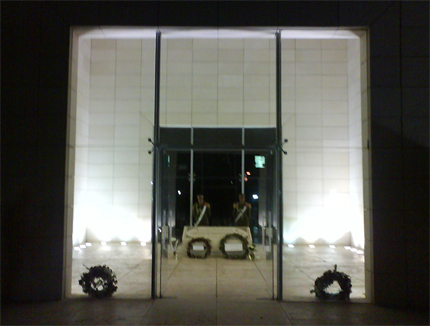A group of scholars and Ph.D. students from Freie Universität Berlin (FUB) went to Israel in February 2010 for the concluding session of Poetics and Politics of the Future. This three-year long project under the direction of Prof. Erika Fischer-Lichte (FUB) and Prof. Freddie Rokem (Tel Aviv University) was funded by the German Israeli Foundation and held several meetings in Berlin and Tel Aviv.
During our stay, we encountered inspiring colleagues, made new friends, and saw performances both culturally and socially different from what we may have been used to – we were encountering Israel and these reflections came up.
Benjamin Wihstutz:
…the Future of your Dreams in Israel today!
There it was again, the advertisement of the airplane magazine of EL AL – the same that made me laugh on my outbound flight to Israel. After having experienced three hours of security check-in with its humiliating procedures, questions and answers just to leave this country. The future? Is there a really a bright future for a country obsessed with fear, defense and security? “Today your future is yours to shape, in Israel. […] Your people. Your home. Your future.” I am not addressed in this ad. It is obvious that I am not meant. Neither anyone from an Islamic, Christian, Buddhist or Hindu background. But wasn’t it once the dream of Theodor Herzl and the Zionist movement to create a society for everyone, for all the people from all countries, from all religions? Didn’t Herzl wrote about an open society with synagogues, churches, mosques, Buddhist and Hindu temples? Now I am asked at the airport if I ever had contact with a person from Gaza. Do I understand? No, I am sorry. I do not comprehend such a fear orientated society. I must admit, Tel Aviv is a wonderful and open-minded place. But to get to and away from this place can be a nightmare. Our collaborative workshop with Tel Aviv University was on “Poetics and Politics of the Future” – on Utopian thinking in performance, on encounters, on the politics of aesthetics. This is suspicious enough to ask more than three times. What was this about? Politics of the Future? Do you know anyone from Gaza? Have you ever visited one of the following countries: Iran, Jordan, Syria, Pakistan, Lebanon? Did you visit the West Bank? Would you please follow me?
I have a dream of a country without fear, of an airline without security check-in. I would choose this airline without hesitation, I would board immediately.
Idit Alphandary:
Encountering Kindness
The encounters that I had with you made me think of the value that fellow feelings have in an intellectual context. In On Kindness, Adam Philips and Barbara Taylor play the role of the devil’s advocates when they state: “Prioritizing the needs of others may be praiseworthy, we think, but it is certainly not normal.” Well …, I think that we normalized hospitality and that for a brief moment we located the need for and created the form of a classical celebration of friendship with the other person. Anxiety over the integrity of one’s identity was dissipated and I began to feel that “Bearing other people’s vulnerability – which means sharing in it imaginatively and practically without needing to get rid of it – entails being able to bear one’s own”, in the language of Philips and Taylor.
Andreas Wolfsteiner
Kristin Flade:
Like in a movie.
As it was my third time in Israel, being back in a foreign or strange place in some situations wasn’t so strange any longer, especially with regards to language and understanding, the initial blurry bliss when encountering layers and layers of unknown or incomprehensible words was pretty diminished. Which is not at all saying that I understand, not even a little, but there’s hints of known, that I clutch to desperately, but lose nonetheless … this will surely be an interesting problem when encountering such situations on a day to day life (now, said that, thinking you’ve grasped something and losing it again, is not honestly something so very outlandish, is it). But, yes.
What you can encounter on the lively street in front of Dizengoff Centre in Tel Aviv, is a man, regularly singing there. He seems strangely lost, especially this song “Chai” in the video below, there in front of this ever so modern shopping mall, maybe nobody remembers. Or it is just a song. At least, most of the pedestrians passed. The song “Chai” which Ofra Haza sang in the 1983 Eurovision Song Contest, held in Munich, states “Yes, I still live, yes, Israel lives” and reached a great popularity then, also, one might assume, adding something to a cultural identity or stating it to a certain extent.
Maybe the addition “be’seret” (in a movie) to this widely spread graffiti in the image below – “Am Israel Chai” (The people of Israel is alive) is actually a valuable assumption. In the mirroring shop windows – all one shiny surface, whereas in the flesh, everyone on their own. Somehow, that is not a statement limited to Israel. Are we not all caught in representational threads and threats, diminishing our ability to humanly interact? Or to interact at all …




